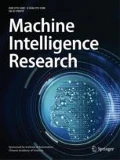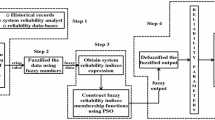Abstract
Procurement planning with discrete time varying demand is an important problem in Enterprise Resource Planning (ERP). It can be described using the non-analytic mathematical programming model proposed in this paper. To solve the model we propose to use a fuzzy decision embedded genetic algorithm. The algorithm adopts an order strategy selection to simplify the original real optimization problem into binary ones. Then, a fuzzy decision quantification method is used to quantify experience from planning experts. Thus, decision rules can easily be embedded in the computation of genetic operations. This approach is applied to purchase planning problem in a practical machine tool works, where satisfactory results have been achieved.
Similar content being viewed by others
References
S. Avraham. Enterprise Resource Planning (ERP): the Dynamics of Operations Management, Kluwer Academic Publishers, Boston, 1999.
S. Biswas, Y. Narahari. Object Oriented Modeling and Decision Support for Supply Chains. European Journal of Operational Research, vol. 153, no. 3, pp. 704–726, 2004.
W. H. Ip, Y. Li, K. F. Man, K. S. Tang. Multi-product Planning and Scheduling Using Genetic Algorithm Approach. Computers & Industrial Engineering, vol. 38, no. 3, pp. 283–296, 2000.
E. A. Silver, R. Peterson. Decision Systems for Inventory Management and Production Planning, John Wiley & Sons, New York, 1985.
Z. T. Balkhi, L. Benkhrouf. On the Optimal Replenishment Schedule for an Inventory System with Deteriorating Items and Time-varying Demand and Production Rates. Computers and Industrial Engineering, vol. 30, no. 4, pp. 823–829, 1996.
Z. T. Balkhi, L. Benkherouf. On an Inventory Model for Deteriorating Items with Stock Dependent and Time-varying Demand Rates. Computers & Operations Research, vol. 31, no. 2, pp. 223–240, 2004.
J. T. Teng, H. J. Chang, C. Y. Dye, C. H. Hung. An Optimal Replenishment Policy for Deteriorating Items with Time-varying Demand and Partial Backlogging. Operations Research Letters, vol. 30, no. 6, pp. 387–393, 2002.
Y. W. Zhou. A Multi-warehouse Inventory Model for Items with Time-varying Demand and Shortages. Computers & Operations Research, vol. 30, no. 14, pp. 2115–2134, 2003.
J. Tang, R. Fung, K. L. Yung, D. Wang. Dependent Policy for Order Quantity Problems with Time-varying Demands. In Proceedings of IEEE Conference on Decision and Control, Florida, USA, pp. 1965–1970, 2001.
J. F. Bard, J. T. Moore. Production Planning with Variable Demand. Omega, vol. 18, no. 1, pp. 35–42, 1990.
B. Catay, S. S. Erenguc, A. J. Vakharia. Tool Capacity Planning in Semiconductor Manufacturing. Computers & Operations Research, vol. 30, no. 9, pp. 1349–1366, 2003.
R. P. Sundarraj, S. Talluri. A Multi-period Optimization Model for the Procurement of Component-based Enterprise Information Technologies. European Journal of Operational Research, vol. 146, no. 2, pp. 339–351, 2003.
M. O. Abuo-El-Ata, H. A. Fergany, M. F. El-Wakeel. Probabilistic Multi-item Inventory Model with Varying Order Cost under Two Restrictions: A Geometric Programming Approach. International Journal of Production Economics, vol. 83, no. 2, pp. 223–231, 2003.
A. Martel, M. Diaby, F. Boctor. Multiple Items Procurement under Stochastic Nonstationary Demands. European Journal of Operational Research, vol. 87, no. 1, pp. 74–92, 1995.
L. A. Zadeh. Fuzzy Logic, Neural Networks, and Soft Computing. Communication of the ACM, vol. 37, no. 1, pp. 77–84, 1994.
J. R. R. Jang, C. T. Sun, E. Mizutani. Neuro-Fuzzy and Soft Computing. Prentice-Hall, Englewood Cliffs, NJ, 1997.
M. Papadrakakis, N. D. Lagaros. Soft Computing Methodologies for Structural Optimization. Applied Soft Computing, vol. 3, no. 4, pp. 283–300, 2003.
L. C. Jain. Fuzzy Logic in Engineering, Soft Computing Techniques in Knowledge-Based Intelligent Engineering Systems. L. C. Jain, Ed., Physica-Verlag, Heidelberg, pp. 44–70, 1997.
S. C. Fang, D. Wang. Fuzzy Mathematics and Fuzzy Optimization. Science Press, Beijing, 1997. (in Chinese)
M. Gen, R. Cheng. Genetic Algorithms and Engineering Design. Wiley, New York, 1996.
J. H. Holland. Adaptation in Natural and Artificial Systems. University of Michigan Press, Ann Arbor, MI, 1975.
Z. Michalewicz. Genetic Algorithms + Data + Structures = Evolution Programs. 2nd ed., Springer-Verlag, New York, 1994.
H. J. Zimmermann. Fuzzy Set Theory and Its Applications. Kluwer-Nijhoff, Hinghum, Netherlands, 1985.
D. Wang, S. C. Fang, H. L. W. Nuttle. Soft Computing for Multi-customer Due-date Bargaining. IEEE Transactions on Systems, Man, and Cybernetics—Part C, vol. 29, no. 4, pp. 566–575, 1999.
Y. Yi, D. Wang. Soft Computing for Scheduling with Batch Setup Times and Earliness-tardiness Penalties on Parallel Machines. Journal of Intelligent Manufacturing, vol. 14, no. 3–4, pp. 311–322, 2003.
D. Wang, K. L. Yung, W. H. Ip. A Heuristic Genetic Algorithm for Subcontractor Selection in a Global Manufacturing Environment. IEEE Transactions on Systems, Man, and Cybernetics—Part C, vol. 31, no. 2, pp. 189–198, 2001.
D. Wang, K. L. Yung, W. H. Ip. Partner Selection Model and Soft Computing Approach for Dynamic Alliance of Enterprises. Science in China: Series F, vol. 45, no. 1, pp. 68–80, 2002.
Author information
Authors and Affiliations
Corresponding author
Additional information
This work was supported by Hong Kong Polytechnic University (No. G.45.37.T363), and the National Natural Science Foundation of PRC (No. 70431003, 60521003).
Kai Leung Yung received his B.Sc. degree from Brighton University, UK, in 1975, the M.Sc degree from Imperial College of Sci. & Tech., University of London, UK, in 1976, and the Ph.D. degree from Plymouth University, UK, in 1985. He has worked for BOC Advanced Welding Co. Ltd., British Ever Ready Group, and the Cranfield Unit for Precision Engineering, in UK. He is currently the associate head and professor of the Department of Industrial and Systems Engineering, the Hong Kong Polytechnic University.
His research interests include precision motion control, systems aspects of computer integrated manufacturing and management, and logistic planning and optimization.
Wai Hung Ip received his M.Sc degree in industrial engineering from Cranfield University, U.K., and the MBA degree from Brunel University, U.K. He was awarded Ph.D. degree in manufacturing engineering from Loughborough University, UK, in 1993. He is currently an associate professor at the Department of Industrial and Systems Engineering, the Hong Kong Polytechnic University.
His research interests include AI-based optimization and decision making, information systems and decision support systems.
Ding-Wei Wang received his B.Sc. degree from Northeastern University, China, in 1982, the M.Sc degree from Huazhong University of Science and Technology, China, in 1984, and the Ph.D. degree from Northeastern University, China, in 1993. He had worked as a post-doctor with North Carolina State University, USA. He is currently a professor of the Institute of Systems Engineering, Northeastern University, China.
His research interests include ERP/MRP-II/JIT, modeling and optimization, production planning and scheduling, fuzzy optimization, and soft computing.
Rights and permissions
About this article
Cite this article
Yung, K.L., Ip, W.H. & Wang, DW. Soft computing based procurement planning of time-variable demand in manufacturing systems. Int J Automat Comput 4, 80–87 (2007). https://doi.org/10.1007/s11633-007-0080-x
Received:
Revised:
Issue Date:
DOI: https://doi.org/10.1007/s11633-007-0080-x




